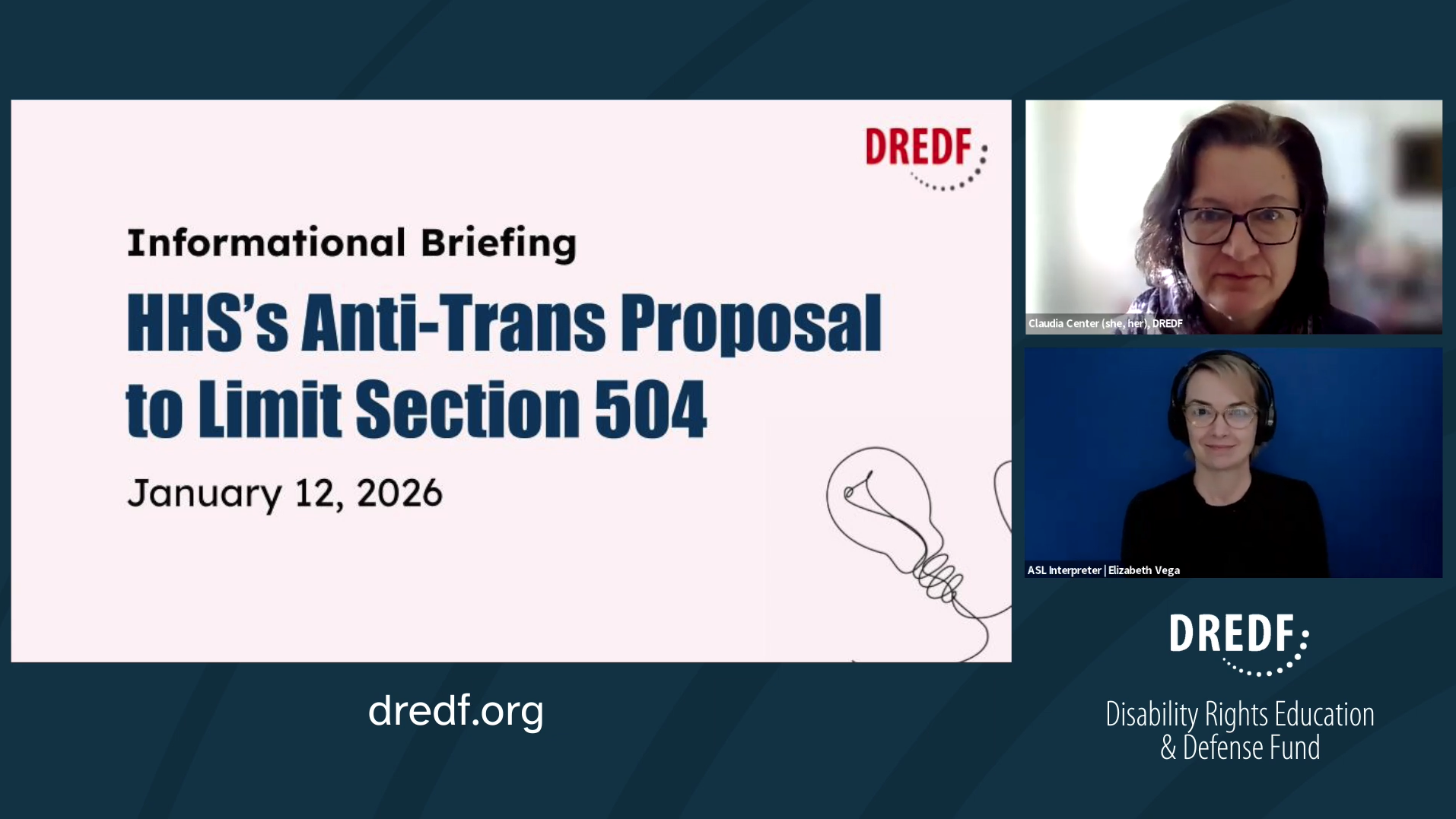
California
Bill Number: SB 380
Download the Letter (PDF) (PDF)
September 22, 2021
Via Email leg.unit@gov.ca.gov
The Honorable Gavin Newsom
Governor of the State of California
State Capitol
Sacramento, CA 95814
RE: VETO Urged – SB 380
Dear Governor Newson:
Disability Rights Education & Defense Fund urges your VETO on Senate Bill 380, which would roll back important protections for individuals with disabilities who are considering using an aid-in-dying drug for the purpose of ending their life. SB 380 would decimate critical safeguards that the Legislature included in the law only a few years ago.
DREDF is a national nonprofit law and policy center dedicated to advancing and protecting the civil and human rights of people with disabilities. DREDF is board- and staff-led by members of the disability community. DREDF has deep expertise in the health disparities experienced by people with disabilities and particularly low-income disabled people of color. DREDF also monitors and publicizes the ableism that infuses the medical profession and affects the medical options made available to people with disabilities.
A recent survey of over 700 practicing physicians across the U.S. found that more than 82 percent self-reported the belief that people with significant disabilities have a worse quality of life than non-disabled people. Lisa I. Iezzoni, et al., “Physicians’ Perceptions of People with Disability And Their Health Care,” Health Affairs 40, no. 2 (Feb. 2021): 297-306. This study affirms prior research that demonstrate healthcare providers’ implicit beliefs about the low quality of life of persons with significant disabilities. See, e.g., Mary Crossley, “Ending-Life Decisions: Some Disability Perspectives,” 33 Ga. State Univ. L. Rev. 900–01 (2017) (reviewing studies); Kenneth A. Gerhart, et al., “Quality of Life Following Spinal Cord Injury: Knowledge and Attitudes of Emergency Care Providers,” 23 Annals Emergency Med. no. 4, 807–12 (1994). This context of ableism in medicine informs DREDF’s views about physician-assisted suicide.
If signed, the law would permit the requests from the individual for physician-assisted suicide to be made only 48 hours apart, not 15 days apart. The law would also eliminate the requirement that the individual seeking to administer a physician-provided fatal drug make a final attestation affirming their choice before administering the drug. These requirements are critical guardrails against erroneous or coerced requests for physician-assisted suicide, and should not be eliminated.
There is substantial medical evidence that an expressed desire for suicide or to hasten death among people with terminal illness can fluctuate over a few days’ time. See, e.g., Harvey Max Chochinov, M.D., Ph.D., et al., “Understanding the Will to Live in Patients Nearing Death,” Psychosomatics 46:1 (Jan.-Feb. 2005). Further, such requests may not be literal requests for assisted suicide or hastened death, but may be forms of communication about end-of-life experiences in particular social, emotional, cultural, and physical contexts. See, e.g., David Busolo and Roberta Woodgate, “Palliative care experiences of adult cancer patients from ethnocultural groups: a qualitative systematic review protocol,” 13:1 JBI Database System Rev Implement Rep. 99-111 (Jan. 2015); Kathrin Ohnsorge, et al., “‘Ambivalence’ at the end of life: How to understand patients’ wishes ethically,” 19:5 Nursing Ethics 629-641 (2012); Yvonne Yi Wood Mak, et al., “Voices of the terminally ill: uncovering the meaning of desire for euthanasia,” 19 Palliative Medicine 343-350 (2005).
For these reasons, the existing requirements of a sufficient period of time between requests, together with a final attestation, are necessary to protect against miscommunication (particularly between a physician and a patient from a different cultural background from the physician), coercion, a failure to offer and provide alternative supports to assisted suicide, and the undue influence of ableism. Two days is far too short. Moreover, eliminating the final attestation is completely contrary to the purportedly shared value among proponents and opponents of informed choice.
Supporters of SB 380 criticize the existing fifteen-day period by citing a Kaiser study showing that some people die after making a first request and before administering the drug. See Assembly Committee on Judiciary, SB 380 (Eggman), Report on Hearing of July 6, 2021. The Kaiser study reported that about 14 percent of requesters (24 out of 176, not one third as suggested) died after making a first request and before making a second request. This is a reflection of the medical characteristics of the individuals who are eligible to request the drug, and is not a basis for virtually eliminating any waiting period. The study also provides no support for removing entirely the final attestation requirement.
Assisted suicide is not about choice when people with disabilities lack access to appropriate medical care. The COVID-19 pandemic has revealed long standing disparities in our health care delivery system as we witnessed disproportionate rates of infection and mortality among Black and Latine Californians, and throughout our senior and disability communities. DREDF supports making available to all Californians ready access to timely rehabilitative, therapeutic, urgent, palliative (pain management), hospice and related health care options other than physician-assisted suicide.
Now more than ever we should be focused on addressing inequities in our health care delivery system, not expanding access to assisted suicide.
Please VETO SB 380.
Sincerely,
Claudia Center
Legal Director
cc: Tam Ma, tam.ma@gov.ca.gov
Anna Billy, anna.billy@sen.ca.gov

